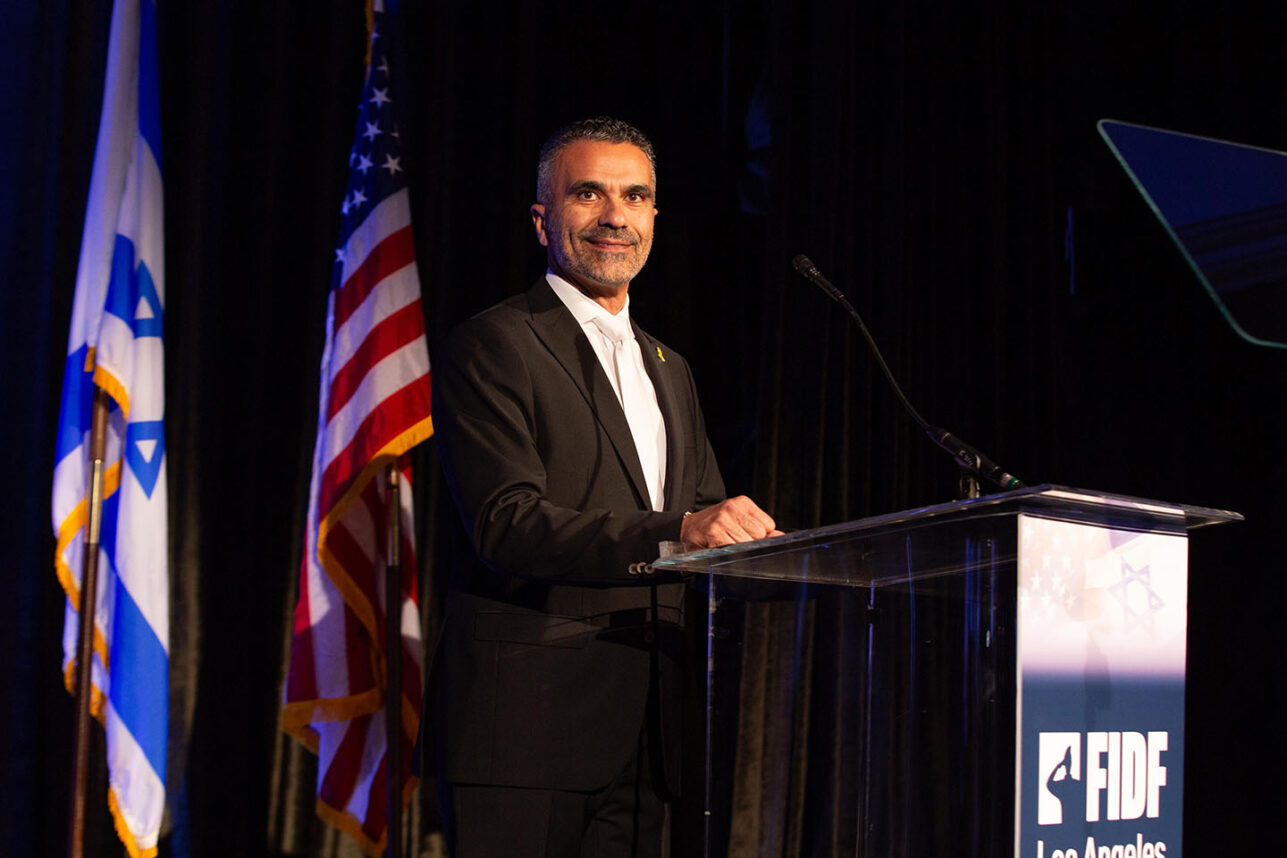Three weeks ahead of the California primary, I was ambling through a crowded tent at the Museum of Contemporary Art’s (MOCA) annual gala when I spotted the Egyptian-born media mogul Haim Saban holding court at the front of the room.
I made my way to the long communal table where he was seated, hoping to take the pulse of the billionaire Democrat once said to be the largest individual donor to the Democratic National Committee. He also happens to be a longtime and devoted friend of the Clintons.
A year ago it seemed unthinkable that Hillary Clinton’s historic bid for the Oval Office could be eclipsed by a septuagenarian Jewish socialist or a bloviating bulvan from New York real estate, but here we were, inching closer to a general election and Clinton’s path to the White House seemed to be growing ever more treacherous: Two months out from the Democratic National Convention, she was still battling her opponent from her own party, even as her Republican challenger clinched his nomination and got straight to work rousing the ghosts of Clinton past.
“I’m not worried,” Saban said in his unmistakable Middle Eastern accent.
Beyond his many roles as a businessman — media proprietor, investor, executive, producer — and philanthropist, Saban has carved a second side career in politics, funding and supporting Democratic campaigns and candidates. He also established The Saban Center for Middle East Policy, a foreign policy think tank in Washington, D.C., in order to influence U.S. strategy in that region.
Saban has always been unequivocal about his motives: “I’m a one-issue guy, and my issue is Israel,” he famously told The New Yorker. Israel is his metaphorical mother, the place that welcomed his family after they were forced to flee Egypt, and he served in the Israel Defense Forces, which he continues to support as a primary philanthropic commitment.
Saban’s involvement in American politics has also coincided with his connection to the Clintons, a relationship that has grown and strengthened over the years. Saban served on the President’s Export Council during Bill Clinton’s administration, advising the White House on trade issues, and reportedly even spent a few nights sleeping there. In 2008, he supported Hillary Clinton’s first bid for the White House, over Barack Obama, though he has since become a vociferous defender of Obama’s record on Israel. (He called Obama’s support for Israel at the United Nations Security Council “unprecedented.”)
When I first interviewed Saban in 2010, he spoke admiringly of both Clintons, describing them as “inspiring leaders” — but it was clear he had special affection for Hillary. He told me he was “devastated” when she lost her first run for president, and he was clearly impressed with her continued devotion to public office.
“Look at her,” he said. “She ran for president, she didn’t get it, she could have said, ‘OK, time for me to either go back to the Senate, or I’m just gonna go have fun.’ And instead, she takes on this job [secretary of state] that is a grind like no other …
“These are people that were born to serve and to lead.”
According to a list the Clintons released to The New York Times, Saban has contributed between $5 million and $10 million to the Clinton Foundation, and since last June, according to the Federal Election Commission, he and his wife, Cheryl, have contributed $7 million to Priorities USA, a political action committee supporting Hillary Clinton.
His financial contributions suggest a robust confidence in her leadership, but in the weeks since the MOCA gala, her campaign has been challenged by an unending onslaught of obstacles: in the press, headlines on the “stigma” of supporting her; on television, presumptive Republican nominee Donald Trump accusing Bill Clinton of “rape”; and then the State Department’s inspector general formally condemning Hillary’s use of a private email server while serving as secretary of state — all of which have contributed to a precipitous decline in her popularity, according to polling data from March up through now.
Public appetite for delving into Clintonian drama never seems to abate, and the so-called “negatives” might seem enough to sink even the hardiest candidate. It has taken a lot less than Hillary has already endured to end previous presidential runs: You might recall George H.W. Bush’s famous last words, “Read my lips, no new taxes”; or when Michael Dukakis got dwarfed by a tank; or how Democratic candidate Howard Dean’s primal scream spelled presidential doom in 2004.
Hillary Clinton, by contrast, has shown a remarkable, almost robotic resilience to challenges, which should give even her most ardent detractors some level of confidence in her implacable ability to lead — even under duress. And yet, when it comes to her campaign, she’s likely to have to fight an increasingly uphill battle against a reckless renegade real estate tycoon — all the way to Election Day.
So, I called Saban at his office last week to ask why he believes Clinton will win.
“Well,” he began, “it comes from my faith in the American people. I believe that, at the end of the day, the American people are going to do the right thing for America and for the world.”
But, I countered, isn’t it true that many of the American people he speaks of are the very ones empowering and emboldening Donald Trump?
“Donald Trump is a disaster,” Saban retorted. “He is a bully who doesn’t have the curiosity to understand the issues; he contradicts himself repeatedly; his views of the world are an unmitigated disaster for America and for the American people, and I believe that all of this will become clearer with time.”
Saban pointed out that Clinton has, in fact, amassed several million more primary votes than either Bernie Sanders or Donald Trump. “That is very indicative of where the American people are,” he said. “Hillary Clinton is a person who has been committed to public service from the very first day she got out of law school until this very day; she has never, ever deviated from being a committed public servant and her history speaks for itself.”
Overall, Saban seemed less concerned with the need to reiterate Clinton’s credentials than the need to obliterate Trump’s. In just under 30 minutes, he managed to call Trump just about every name in the book: buffoon, bully, clown, fraud, pathological liar and, finally, “a cynical, self-serving, self-centered egomaniac.”
“He’s not a successful businessman; he is not a billionaire; this is a guy, who, I promise you, doesn’t pay taxes … and he is an oppressor of the weak,” Saban said. He illustrated his critique with a personal anecdote: “He claims that he ‘never settles’ — well, all I can tell you as chairman of Univision is that he sued us and he settled.”
At this point, one of Saban’s PR reps, who was also on the phone, sensed that Saban was getting a little excited and requested that the details of the settlement not be disclosed in my article. “To be honest with you, I want my opinion of Trump out there,” Saban insisted. “I think that he is a danger to America.”
Saban is equally concerned that Trump would be a danger to Israel:
“One day he says he’s going to be neutral on the issue of the Israeli-Palestinian problem, and the next day — I guess after he gets some Republicans to give him a lot of money — he says, ‘Yes, Israel should build in the settlements.’ The danger here is that he doesn’t understand the conflict between those two statements; he just doesn’t get it. He is an improviser on every single issue. There is not one issue that he has studied enough to be able to speak about it in a way that makes sense. And then he goes back on everything he says: One day, he says he’s gonna block the Muslims, and the next day he says, ‘Well it was just a suggestion.’ What a candidate says … these words carry weight. We cannot just dismiss the fact that he keeps contradicting himself. We don’t know what he stands for.”
Of course, Clinton’s critics also claim that she cannot be trusted, citing her use of the private email server, the transcripts of her speeches to Wall Street that she refuses to release, and the potentially problematic donations from foreign powers to the Clinton Foundation. I ask Saban why he trusts her.
“Because I know her personally, and I know what her beliefs are. I know that she wants what’s good for the American people, and she wants what’s good for [the] U.S.-Israel relationship. For me, that’s enough,” he said. “And then you add to that, that no one has run for office over the last 30 years with her kind of experience, [and with the] relationships and respect that she has with leaders around the world. And when you compare the relationship [world leaders] have with Hillary versus Trump — who says about our staunchest ally throughout all times, the UK, that he’s not gonna get along with [British Prime Minister David] Cameron, this is an outrage that’s beyond comprehension! Who in the world does he think he is?”
With all the focus on Trump, it is clear Saban isn’t worried about Bernie Sanders pulling off a major victory in California next week. But it must give him pause that Sanders’ performance during this campaign earned him a coveted five appointments to the Democratic Party Platform Committee, to which Sanders included Arab American Institute founder James Zogby and leftist philosopher Cornel West, both vocal critics of Israel and Israeli policy, who wish to see fundamental changes made to the U.S. relationship with Israel.
Saban was reluctant to speculate about the outcome of those appointments or the potential influence they might have on the future of the Democratic Party, but he did sum up Bernie Sanders as “an anti-Israel person,” claiming the appointments are consistent with “who he has been for 25 years.”
“There’s no surprise there,” Saban said.
Later in the day, Saban’s team reached out to me about scheduling a second interview because something was weighing on him that he felt was important to add to our conversation. The next morning, he painted a portrait of a plausible future scenario:
Let’s say the prime minister of Israel disagrees with the president of the United States on an issue like, say, the Iran Deal. And let’s say the Israeli prime minister is so concerned about the deal’s ramifications for his country’s security, he travels to the United States to make a personal plea to the U.S. Congress not to support the president’s legislation.
“If, God forbid, Donald Trump makes it to the Oval [Office] and something similar to what happened with the Iran Deal [were to occur], I believe that he would most probably take action that would cause irreparable damage to this important relationship to both countries.
“Between friends,” Saban added, “there is room for disagreement. But you do not disagree with Donald Trump.”
Remember secretary Clinton’s infamous phone call with Bibi Netanyahu, when she reportedly lectured him for nearly 45 minutes? “I learned that Bibi would fight if he felt he was being cornered, but if you connected with him as a friend, there was a chance you could get something done together,” Clinton later wrote in her State Department memoir.
If anyone is unclear on the candidates’ very different approaches to Israel, Saban offered the following comparison:
“The difference between the two is: One has marched as the grand marshal in support of Israel in the streets of New York, and one has, for 25 years, had a policy for protecting Israel from all the threats around it. One has negotiated a truce with Egypt’s help and a cease-fire with Hamas, and one has marched down the streets of New York…
“You decide who would be more appropriate to safeguard that relationship.”
Danielle Berrin is a senior writer and columnist at the Jewish Journal. Follow her on Twitter @hollywoodjew























 More news and opinions than at a Shabbat dinner, right in your inbox.
More news and opinions than at a Shabbat dinner, right in your inbox.